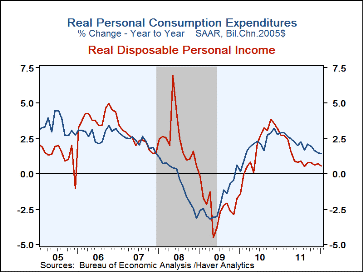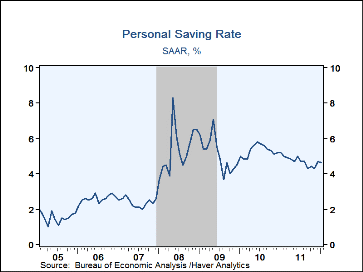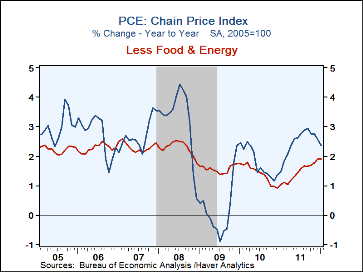 Global| Mar 01 2012
Global| Mar 01 2012U.S. Income & Spending Weaken
by:Tom Moeller
|in:Economy in Brief
Summary
Individuals' wherewithal to spend diminished last month, so they didn't. Disposable personal income increased a scant 0.1% (2.3% y/y) as taxes jumped 1.6% (8.7% y/y). Adjusted for prices, disposable income slipped 0.1% m/m (+0.6% [...]
 Individuals' wherewithal to spend diminished last
month, so they didn't. Disposable
personal income increased a scant 0.1% (2.3% y/y) as taxes jumped 1.6%
(8.7% y/y). Adjusted for prices, disposable income slipped 0.1% m/m (+0.6%
y/y). Personal income overall rose 0.3%
following an unrevised 0.5% December gain. The latest missed Consensus
expectations for a 0.4% rise. Holding back the gain in overall income were
declines in Medicare (+1.5% y/y) and unemployment benefits (-18.1% y/y).
Wage & salary disbursements increased 0.4% (5.0% y/y) after an
upwardly revised 0.4% December gain.
Individuals' wherewithal to spend diminished last
month, so they didn't. Disposable
personal income increased a scant 0.1% (2.3% y/y) as taxes jumped 1.6%
(8.7% y/y). Adjusted for prices, disposable income slipped 0.1% m/m (+0.6%
y/y). Personal income overall rose 0.3%
following an unrevised 0.5% December gain. The latest missed Consensus
expectations for a 0.4% rise. Holding back the gain in overall income were
declines in Medicare (+1.5% y/y) and unemployment benefits (-18.1% y/y).
Wage & salary disbursements increased 0.4% (5.0% y/y) after an
upwardly revised 0.4% December gain.
Personal consumption expenditures increased 0.2% (3.8% y/y) after an unchanged December. Expectations had been for a 0.4% rise. The increase was held back by flat spending on services (+3.4% y/y). Nondurables spending rose 0.4% even though spending on gasoline fell 0.8% (+2.0% y/y); down 1.7% (-6.7% y/y) in real terms. Spending on durable goods jumped 0.9% (6.0% y/y) driven by a 2.3% gain 9.4% y/y) in motor vehicle purchases. Adjusted for inflation personal spending was flat (1.4% y/y) for the third consecutive month.
The personal savings rate fell to 4.6% from an upwardly revised 4.7% during December. It remained below 5.2% twelve months ago.
The PCE chain price index rose 0.2% last month (2.4% y/y), the strongest increase since September. The increase reflected a 0.9% rise (9.4% y/y) in gasoline prices. The core PCE price deflator rose 0.2% and the y/y increase of 1.9% was up from the record low 12-month change of 0.9% reached last December.
The personal income & consumption figures are available in Haver's USECON and USNA databases. The expectations figures are in the AS1REPNA database.
| Personal Income & Outlays(%) | Jan | Dec | Nov | Y/Y | 2011 | 2010 | 2009 |
|---|---|---|---|---|---|---|---|
| Personal Income | 0.3 | 0.5 | 0.0 | 3.6 | 5.1 | 3.7 | -4.3 |
| Wages & Salaries | 0.4 | 0.4 | -0.0 | 5.0 | 4.3 | 2.2 | -4.3 |
| Disposable Personal Income |
0.1 | 0.4 | -0.0 | 3.0 | 3.8 | 3.6 | -2.1 |
| Personal Consumption Expenditures |
0.2 | -0.0 | 0.0 | 3.7 | 4.4 | 3.4 | -1.9 |
| Saving Rate | 4.6 | 4.7 | 4.3 | 5.2 (Jan'11) |
4.7 | 5.3 | 5.1 |
| PCE Chain Price Index | 0.2 | 0.1 | 0.1 | 2.4 | 2.5 | 1.8 | 0.2 |
| Less Food & Energy | 0.2 | 0.1 | 0.1 | 1.9 | 1.4 | 1.4 | 1.6 |
| Real Disposable Income |
-0.1 | 0.3 | -0.1 | 0.6 | 1.3 | 1.8 | -2.3 |
| Real Personal Consumption Expenditures |
0.0 | -0.0 | -0.0 | 1.4 | 2.2 | 2.0 | -1.9 |
Tom Moeller
AuthorMore in Author Profile »Prior to joining Haver Analytics in 2000, Mr. Moeller worked as the Economist at Chancellor Capital Management from 1985 to 1999. There, he developed comprehensive economic forecasts and interpreted economic data for equity and fixed income portfolio managers. Also at Chancellor, Mr. Moeller worked as an equity analyst and was responsible for researching and rating companies in the economically sensitive automobile and housing industries for investment in Chancellor’s equity portfolio. Prior to joining Chancellor, Mr. Moeller was an Economist at Citibank from 1979 to 1984. He also analyzed pricing behavior in the metals industry for the Council on Wage and Price Stability in Washington, D.C. In 1999, Mr. Moeller received the award for most accurate forecast from the Forecasters' Club of New York. From 1990 to 1992 he was President of the New York Association for Business Economists. Mr. Moeller earned an M.B.A. in Finance from Fordham University, where he graduated in 1987. He holds a Bachelor of Arts in Economics from George Washington University.
More Economy in Brief
 Global| Feb 05 2026
Global| Feb 05 2026Charts of the Week: Balanced Policy, Resilient Data and AI Narratives
by:Andrew Cates








